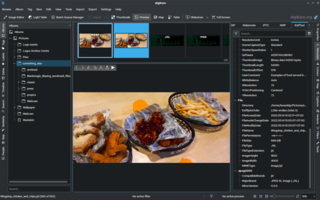
Vorbis is a free and open-source software project headed by the Xiph.Org Foundation. The project produces an audio coding format and software reference encoder/decoder (codec) for lossy audio compression, libvorbis. Vorbis is most commonly used in conjunction with the Ogg container format and it is therefore often referred to as Ogg Vorbis.

FLAC is an audio coding format for lossless compression of digital audio, developed by the Xiph.Org Foundation, and is also the name of the free software project producing the FLAC tools, the reference software package that includes a codec implementation. Digital audio compressed by FLAC's algorithm can typically be reduced to between 50 and 70 percent of its original size and decompresses to an identical copy of the original audio data.
FAAC or Freeware Advanced Audio Coder is a software project which includes the AAC encoder FAAC and decoder FAAD2. It supports MPEG-2 AAC as well as MPEG-4 AAC. It supports several MPEG-4 Audio object types, file formats, multichannel and gapless encoding/decoding and MP4 metadata tags. The encoder and decoder is compatible with standard-compliant audio applications using one or more of these object types and facilities. It also supports Digital Radio Mondiale.

digiKam is a free and open-source image organizer and tag editor written in C++ using the KDE Frameworks.
The Extensible Metadata Platform (XMP) is an ISO standard, originally created by Adobe Systems Inc., for the creation, processing and interchange of standardized and custom metadata for digital documents and data sets.

XnView is an image organizer and general-purpose file manager used for viewing, converting, organizing and editing raster images, as well as general purpose file management. It comes with built-in hex inspection, batch renaming, image scanning and screen capture tools. It is licensed as freeware for private, educational and non-profit uses. For other uses, it is licensed as commercial software.

Metalink is an extensible metadata file format that describes one or more computer files available for download. It specifies files appropriate for the user's language and operating system; facilitates file verification and recovery from data corruption; and lists alternate download sources.

A tag editor is an app that can add, edit, or remove embedded metadata on multimedia file formats. Content creators, such as musicians, photographers, podcasters, and video producers, may need to properly label and manage their creations, adding such details as title, creator, date of creation, and copyright notice.

PeaZip is a free and open-source file manager and file archiver for Microsoft Windows, ReactOS, Linux, MacOS and BSD by Giorgio Tani. It supports its native PEA archive format and other mainstream formats, with special focus on handling open formats. Version 9.4.0 supported 234 file extensions.
A software repository, or repo for short, is a storage location for software packages. Often a table of contents is also stored, along with metadata. A software repository is typically managed by source or version control, or repository managers. Package managers allow automatically installing and updating repositories, sometimes called "packages".
The following is a comparison of e-book formats used to create and publish e-books.

NewGenLib is an integrated library management system developed by Verus Solutions Pvt Ltd. Domain expertise is provided by Kesavan Institute of Information and Knowledge Management in Hyderabad, India. NewGenLib version 1.0 was released in March 2005. On 9 January 2008, NewGenLib was declared free and open-source under GNU GPL. The latest version of NewGenLib is 3.1.1 released on 16 April 2015. Many libraries across the globe are using NewGenLib as their Primary integrated library management system as seen from the NewGenlib discussion forum.

Exaile is a cross-platform free and open-source audio player, tag editor and library organizer. It was originally conceived to be similar in style and functions to KDE's Amarok 1.4, but uses the GTK widget toolkit rather than Qt. It is written in Python and utilizes the GStreamer media framework.
The following comparison of audio players compares general and technical information for a number of software media player programs. For the purpose of this comparison, "audio players" are defined as any media player explicitly designed to play audio files, with limited or no support for video playback. Multi-media players designed for video playback, which can also play music, are included under comparison of video player software.

Puddletag is a graphical audio file metadata editor ("tagger") for Unix-like operating systems.
Software Package Data Exchange (SPDX) is an open standard for software bill of materials (SBOM). SPDX allows the expression of components, licenses, copyrights, security references and other metadata relating to software. Its original purpose was to improve license compliance, and has since been expanded to facilitate additional use-cases, such as supply-chain transparency and security. SPDX is authored by the community-driven SPDX Project under the auspices of the Linux Foundation.

qmmp is a free and open-source cross-platform audio player that is similar to Winamp. It is written in C++ using the Qt widget toolkit for the user interface. It officially supports the operating systems Linux, FreeBSD and Microsoft Windows. In most popular Linux distributions, it is available through the standard package repositories. Until Audacious switched to Qt in version 4.0, qmmp was the only audio player to use Qt and not feature a database.

Lector is a free e-book reading application for desktop Linux systems that also has basic collection management features.

Foliate is a free e-book reading application for desktop Linux systems. The name refers to leaves, meaning "(getting) leafy" or "…-leaved".










